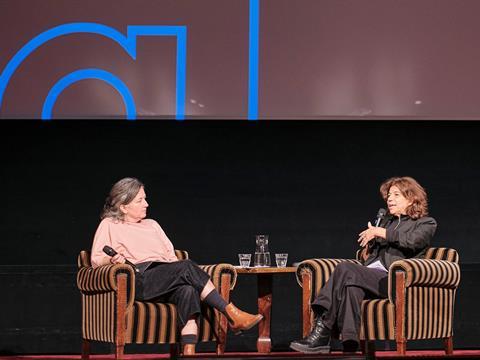
Susana de Sousa Dias, the Portuguese filmmaker and artist, has made a passionate plea for filmmakers to continue standing up against authoritarianism in all its guises.
“The rise of the far right, the loss of freedom, and the rise in censorship again in democratic countries. This is very, very disturbing,” said de Sousa Dias, the guest of honour of International Documentary Festival Amsterdam (IDFA) in conversation with artistic director Isabel Arrate Fernandez.
The festival is screening a full retrospective of her work and is also showing 10 films by which she has been influenced.
Explaining her dogged approach to her work, the director quoted Werner Herzog: “He once said that to be a filmmaker, you have to use all your criminal energy. I have used my criminal energy,” she said of her many battles with Portuguese authorities over such matters as rights to use state- owned archival material.
The filmmaker spoke at length about her earlier films, several of which deal with the legacy of Portuguese fascism and try to “fill the gaps” in the history of the period.
Revolution
De Sousa Dias comes from a cinematic background, as her father was a filmmaker and architect. She was 12 years old at the time of the Portuguese revolution of 1974, which overthrew the authoritarian dictatorship of Antonio de Oliveira Salazar’s long-running Estado Novo government. In the period that followed, de Sousa Dias steeped herself in cinema, watching the work of Pasolini, Fellini and Visconti, among others.
“Suddenly, everything was open. I watched everything I could,” she said of her teenage cinephilia.
Her filmmaking career began in earnest in 2001 when she was invited to make a documentary about Portuguese cinema between 1930 and 1945, Uma Época de Ouro: 1930-1945.
“I went to the archives and I watched everything. I was really astonished with the images I found, especially about the former colonies,” she recalled.
Much of her work since then has used archival material. One key moment in her career came when her mother was doing a master’s degree in women’s studies, researching the stories of two nurses in Portugal, Sisters Isaura Borges Coelho and Hortênsia Campos Lima, who were imprisoned simply because they wanted to marry. This led de Sousa Dias to make her own 50-minute film, Criminal Case 141/53.
Working on this documentary brought her to explore the archives of the political police for the first time. “Once you enter into a political police archive, you never get out,” she reflected.
Her work there led to her celebrated 2005 documentary, Still Life, which looked in depth at the four decades of the Salazar dictatorship. “I wanted to explain everything I could,” she said of her headfirst deep dive into the imagery of one of the darkest episodes in Portuguese history.
“If you go to the political archives, you won’t see any references to torture. You’ll see reports on the interrogation of the prisoners but they won’t tell you that meanwhile they tortured them. We have to fill the gaps.”
De Sousa Dias, who co-founded production company Kintop in 2001, acknowledged working in the archives was a deeply disturbing experience. She was using images in her film that were created by the dictatorship, but was trying to show them in a very different context.
The filmmaker based her 2009 feature doc 48 around government mugshots of political prisoners combined with recordings of their voices. Through this use of image and testimonies, she was attempting to convey what really went on in the prisons, and to fill her film with “traces” of the torture these prisoners endured.
Early in her career, de Sousa Dias’ work was largely shunned in Portugal. It was only when she was feted internationally that local funders and institutions began to support her.
“I suffered a lot with the [industry] in Portugal,” she said. “They didn’t finance [me]. Even if I had Arte [backing] and a super French producer, I got no money. All the festivals refused the film…it was horrible. The only reason I managed to make the films was because was…I got international recognition.”
Now, she said, “It’s completely different.”
De Sousa Dias’ latest feature doc, Fordlândia Panacea, is a world premiere this week in IDFA’s Envision Competition. This is a follow-up to her earlier work, Fordlandia Malaise, looking at Henry Ford’s failed Utopian dream of building a rubber factory in the Brazilian jungle.
















![[L-R]: Amanda Villavieja, Laia Casanovas, Yasmina Praderas](https://d1nslcd7m2225b.cloudfront.net/Pictures/274x183/6/4/1/1471641_pxl_20251224_103354743_618426_crop.jpg)








No comments yet